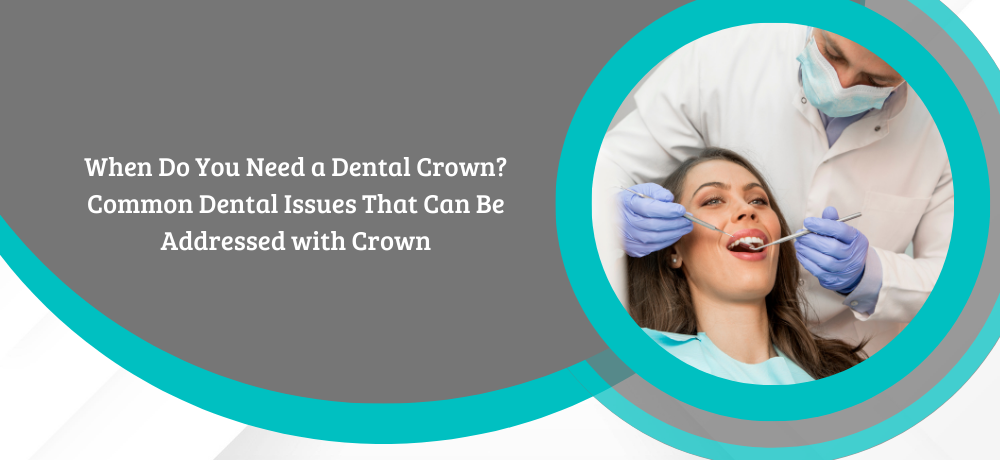When Do You Need a Dental Crown? Common Dental Issues That Can Be Addressed with Crowns

A smile is often considered one of the most captivating features, exuding confidence and warmth. Yet, behind that beautiful smile lies an intricate structure that requires meticulous care and attention. Dental health plays a pivotal role in not only the aesthetic appeal but also the overall well-being of an individual. Among the various dental procedures available, dental crowns have emerged as versatile solutions to a multitude of oral issues, restoring both function and appearance.
In this comprehensive blog, we will delve into the various dental conditions that can be effectively tackled with dental crowns. From exploring the underlying causes that warrant their application to understanding the procedure's intricacies, we aim to provide a perspective on how dental crowns contribute to oral health and the overall quality of life.
Understanding What Dental Crowns Are and When You Need Them
Dental crowns, or caps, are custom-made prosthetic restorations that encase a damaged tooth from the gum line upwards, providing strength, protection, and enhancement. These crowns are crafted from a variety of materials, including porcelain, metal alloys, or a combination of both, and are designed to blend with the surrounding teeth, mimicking natural aesthetics seamlessly. While the primary objective of a dental crown is to salvage a compromised tooth, its benefits extend far beyond structural integrity.
The decision to opt for a dental crown is typically based on the assessment of a dentist, who evaluates the extent of damage and the potential implications for the affected tooth. Several common dental issues can be effectively addressed by applying dental crowns. One of the prevalent scenarios is severe tooth decay that has eroded a significant portion of the tooth structure, leaving it vulnerable and weakened. A dental crown acts as a protective shield, encapsulating the damaged tooth and preventing further deterioration.
Furthermore, dental crowns play a pivotal role in the comprehensive treatment of root canal therapy, a procedure undertaken to salvage teeth infected at their core. After removing the infected pulp, the tooth structure can become brittle over time. A dental crown reinforces the tooth's structural integrity and restores its functionality, allowing patients to bite and chew comfortably.
Dental crowns can address cosmetic concerns as well. Teeth that are severely discolored, misshapen, or have undergone extensive cosmetic alterations can be transformed by applying crowns and harmonizing them with the rest of the smile. Additionally, crowns are a key solution for addressing fractures, chips, or breaks in teeth caused by accidents or trauma. These restorations not only repair the physical damage but also restore the tooth's original appearance, enabling individuals to smile confidently once again.
Common Dental Issues That Dental Crowns Can Address
Cracked or Chipped Teeth
Accidents happen, and sometimes teeth bear the trauma. Dental crowns provide a robust solution for cracked or chipped teeth, preventing further damage and enhancing the tooth's integrity. A crown acts as a protective barrier, holding the tooth together and preventing the crack from worsening. This restores the tooth's strength and prevents sensitivity and discomfort caused by exposed nerves.
Severe Tooth Decay
When decay wreaks havoc on a tooth, a crown can be the saving grace. Dentists meticulously remove the decayed portion and cap the tooth with a crown, preventing the need for extraction. This approach saves the natural tooth structure and prevents the spread of infection. The crown covers the treated tooth, restoring its functionality and appearance and allowing you to enjoy a healthy smile once again.
Root Canal Treated Teeth
Following a root canal treatment, a tooth become brittle. A dental crown strengthens the tooth and protects it from potential fractures. The tooth's structure can be compromised after removing the infected pulp during a root canal. Placing a crown over the treated tooth provides reinforcement, preventing any fractures and ensuring the tooth remains functional for years to come.
Misshapen or Discolored Teeth
Cosmetic imperfections can affect your self-esteem. Dental crowns come to the rescue by concealing misshapen or discolored teeth, giving you a radiant and harmonious smile. Whether your teeth are discolored due to genetics, medication, or external factors, crowns can be customized to match the shade of your natural teeth, creating a seamless and beautiful result.
Dental Bridges and Implants
Dental crowns are pivotal in securing dental bridges and implants. They anchor these restorations in place, ensuring stability and functionality. A dental bridge replaces missing teeth by anchoring to adjacent teeth, while dental implants replace the root of a missing tooth. Crowns are placed over these, providing a natural appearance and allowing you to enjoy the full function of your teeth once again.
Don't let dental issues hinder your quality of life. If you're grappling with any of the aforementioned dental concerns, a dental crown could be the answer you're seeking. At Dentists on Bloor, we're committed to transforming smiles and enhancing oral health through our comprehensive services. Get in touch with Dentists on Bloor today to learn more about how dental crowns can address your specific needs. To learn more about the services we offer, please click here. To contact us, please click here or call us at (416) 588-8839.
Remember, a radiant smile begins with a healthy foundation—let us be your partners in achieving lasting dental wellness.
.jpg)